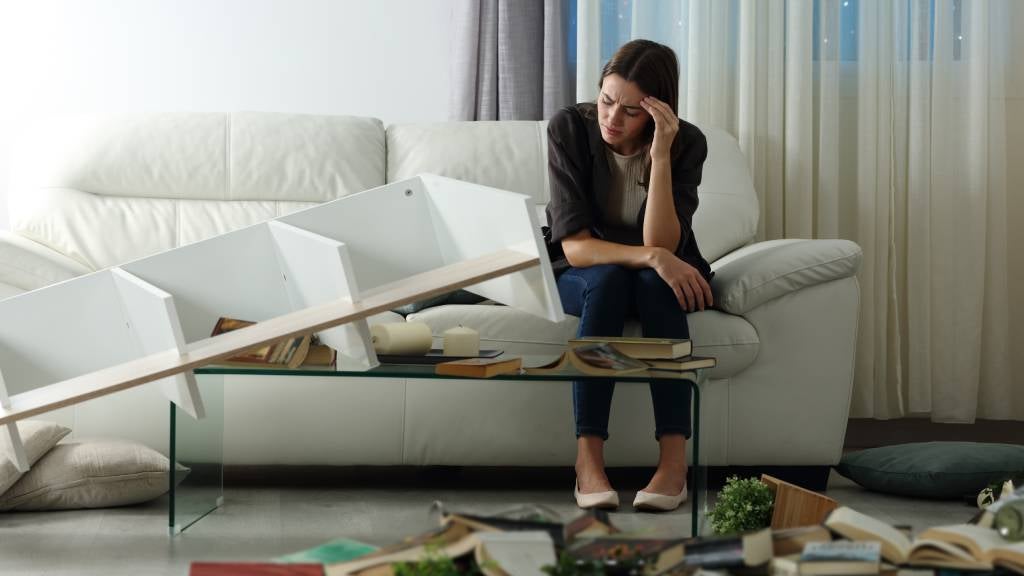Someone broke into my house: What should I do?

While we all hope that we won’t become victims of home break-ins, the Australian Bureau of Statistics reported in 2023 that there has been a spike in burglaries in Australia with over 194,000 home break-ins taking place over a 12-month period.
No one wants to experience a home invasion and discovering that someone has broken into your home can be deeply distressing. That’s why it’s essential to take steps to protect your safety, wellbeing, and belongings.
Responding to a burglary
If the break-in takes place when you are home, it’s known as aggravated burglary. If you hear or see someone break into your home while you are there, some steps you can follow include:
- Keep calm and quiet
- Leave if you can do so safely
- Hide in a safe place if you can’t leave
- Call 000 and ask for the police
However, most burglars often target homes when the residents aren’t there. If you come home to signs of a break-in, such as a broken window or lock, here’s what you can do:
Contact the police
You should contact the police as soon as possible. If the burglar has already left the scene and there is no threat to your safety, you can submit a crime report via the hotline for your state or territory or online:
- Victoria
- New South Wales
- Western Australia
- Queensland
- Northern Territory
- Australian Capital Territory
- South Australia
- Tasmania
When you file a report, the police will ask you for a list of missing items and if there is any damage to your property. You should make this list before they arrive and take photos of damage caused by the break-in, but be careful not to touch anything as it may be considered evidence. This list will also be useful when lodging a claim with your home and contents insurance provider.
The police may then decide to visit your property to conduct a forensic search to check for fingerprints and any other evidence.
Safeguard your ID and finances
If your wallet or identity documents were stolen, such as your passport or driver’s licence, then you should contact the issuer of those documents, such as the passport office or the roads and traffic authority in your state or territory and have them replaced.
You may also want to ask your financial institution to cancel your credit cards and bank cards and monitor for any unauthorised transactions on your account.
Dealing with the trauma of a burglary
People can often experience post-traumatic stress after a break-in. If you’re left feeling shaken by the burglary, it can be worth speaking to a counsellor or therapist. Government-funded counselling may be available to you, check with your local state or territory office to see what options are available.
Post break-in: What to do
Notify your insurance company
Once the police file their report, you can get in touch with your insurance company. To lodge a claim, you’ll need to provide details about what happened with a copy of the police report. It’s a good idea to read the Product Disclosure Statement (PDS) to understand what is covered under your policy and any value limits that apply. Your insurance provider will assess your claim and guide you through the next steps for repairs or replacement of items.
Home security options
After a break-in, it’s important to assess the security of your home. If any doors or windows were damaged to gain access to your home, you should have them repaired immediately. And if your keys were stolen, you’ll need to change your locks to prevent a follow-up burglary.
You could also take further security measures, such as:
- installing a home security system with cameras and alarms – many new models can be paired with your phone and send notifications through an app if they detect movement in your absence;
- upgrading locks on doors and windows – for example, smart locks or deadbolts;
- investing in motion-sensor floodlights near both the back and front entrance of your home;
- using a safe to store your valuables and keeping an updated list of all your valuables in a safe place so you can refer to it in the case of a burglary. It can help when you’re lodging your insurance claim.
Follow-up measures
Review your security measures
Strengthening your home security may help prevent another break-in. Here are some tips to keep your home and contents safe:
- Make an emergency plan so every person in the household knows what to do during and after a burglary.
- Consider keeping a light or television on to make the home look occupied while you’re out.
- Lock all doors and windows before leaving – double checking that common entry points for intruders, such as the garage and kitchen doors, are secure.
- Ask family, friends, or neighbours to keep an eye on your property and collect your mail when you go away.
- Be on the watch for signs that your house is marked, such as unfamiliar people or vehicles regularly on the street outside, or strange markings on a wall or fence.
- Make sure your valuables are stored in a safe or at least out of sight from the windows.
- Keep your garden well-maintained with hedges, trees, and shrubs trimmed to avoid blind spots.
Protect your home
As well as taking safety measures, check that you are protected from the unexpected and your home and contents insurance is up-to-date and covers your most valuable possessions. Get a quote online today with Real Home Insurance – it covers anything from broken windows to bushfires and can help give you peace of mind.
12 Feb 2024